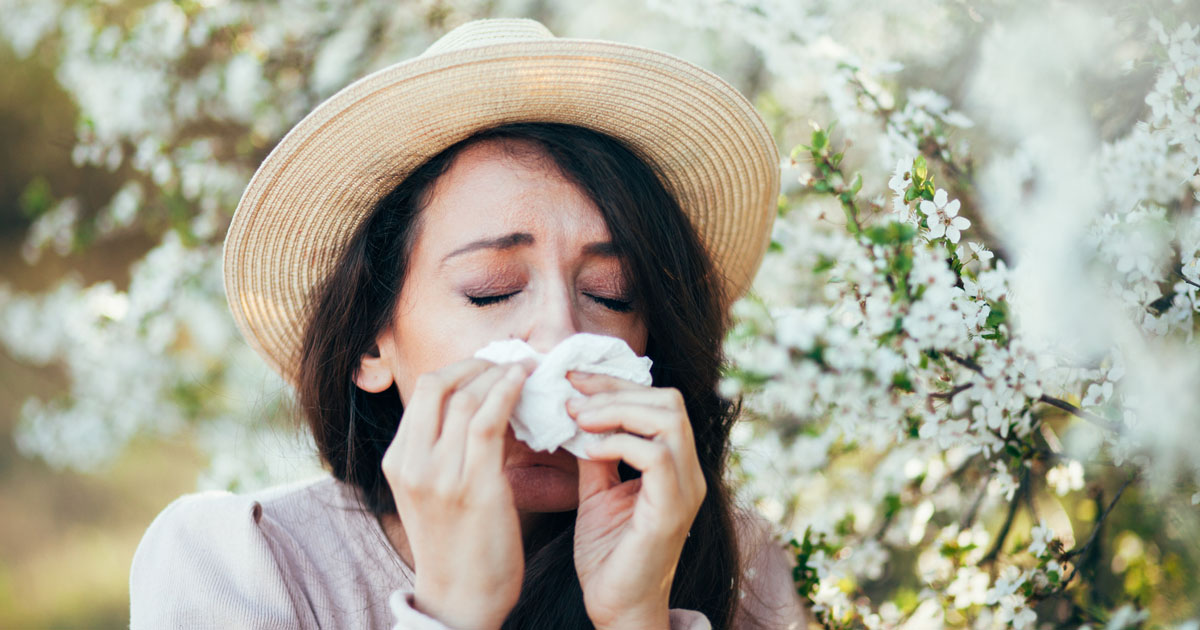
Winter is a bummer for those who can’t stand the cold, but for people who suffer from spring allergies, the warmer weather isn’t exactly a walk in the park. In fact, such an outdoor activity may make matters worse.
With spring in full bloom, know that you’re not alone. There are almost 50 million Americans affected by spring allergies. There may be no “cure,” but the more you know about spring allergies, the better you may be able to alleviate your symptoms or stop them from forming in the first place.
Grab a tissue and hold on tight. You may be sniffling as you read this, but relief is possible when you take preventative measures and plan accordingly. That said, a before-you-sneeze “Bless you” seems appropriate at this point.
Flowers and fresh leaves look far nicer than a mound of dirty snow collected on the curb, but once the pollen particles are released into the air, suddenly that snow doesn’t seem so bad. Pollen, the main cause of all seasonal allergies, contributes to allergy aggravations such as:
Trees, grass, flowers, and weeds release these tiny grains (of pollen) into the air to fertilize other plants. When they get into the nose of someone who’s allergic, they send the body’s defenses haywire. There’s no stopping mother nature, so how can you avoid hay fever (allergy to pollen)? How you face each day can prove beneficial in lessening your lousy feelings.
The outdoors may actually not feel so great to an allergy sufferer, so it’s best to avoid the pesky pollen outside. Easy to say, but how do you actually do this? Technology can help. There are several sources, including pollen.com, that offer allergy alerts and allergy forecasts so you can plan your time outside when pollen counts are low. You can even keep an “allergy diary” to note your triggers, symptoms, and solutions. It may not be as fun as Instagram, but it’s far more useful—at least in this case.
After rainy days, expect your allergies to be worse. The pollen count rises and you’ll definitely feel it. Stay home if you can, otherwise, brace yourself for the symptoms. Windy and breezy days are usually even worse, as the pollen swirls through the air.
Just as you should avoid the outside during heavy pollen days, you should also think about what you let into your house.
Rather than opening your windows to cool off, run the air conditioner instead. You can also invest in HEPA-certified air filters to reduce the pollen element in your home. Whatever filter your home uses, be sure to change it often during allergy season.
If you have a pet that runs around outdoors, clean them more often during springtime, as the pollen can collect on their fur. Once it’s on them, it’s in your house, getting into your rugs and furniture.
The same applies to you. Change clothes as soon as you get back inside and wash your clothes and hair to remove any pollen. One place people often forget to clean is their car, which can accumulate pollen from the air vents or open windows, too.
Stress won’t give you allergies, but it won’t help. Your body isn’t at its peak to protect itself when you’re worried, anxious, overly emotional, or unhinged. Not only can this cause your allergic symptoms to flare up, but it can affect other areas of your health and wellbeing as well.
Harvard Health explains, “Stress hormones can ramp up the already exaggerated immune system response to allergens (as per Dr. Ahmad Sedaghat, an ear, nose, and throat specialist at Harvard-affiliated Massachusetts Eye and Ear Infirmary).”
To take the edge off and chill out, try meditation, yoga, exercise, or however you like to relax. Get enough sleep, eat well, and avoid stressful situations when possible. Even petting your furry friend is soothing—just be sure you’re not allergic!
Yes. Allergy relief is out there but be sure to consult with your doctor before taking it upon yourself to alleviate your symptoms. Antihistamines and decongestants won’t cure your allergies, but they’ll give you much-needed relief for a runny or congested nose. So, what’s the difference?
You shouldn’t drive when you take some antihistamines because they can make you drowsy. The newer generation antihistamines are longer lasting and usually don’t cause drowsiness but may not seem as effective. Decongestants may also cause side effects, such as:
If meds aren’t your thing, go natural with a neti pot. Simply fill the vessel with warm water and salt as directed and clear out the nasal passages as recommended. The salt solution loosens mucus to relieve congestion and clears out allergens, such as pollen or pet dander. For a quick solution, you can also use a pre-measured saline spray, available in most drugstores.
So, embrace spring if you can. Yes, allergies are inevitable, but with the right relief, you will deal with the season more successfully!
vybe urgent care’s providers can help you manage spring allergies with medication and other therapies. Our urgent care services are also available seven days a week if your allergies develop into a sinus infection.
FIND YOUR VYBE